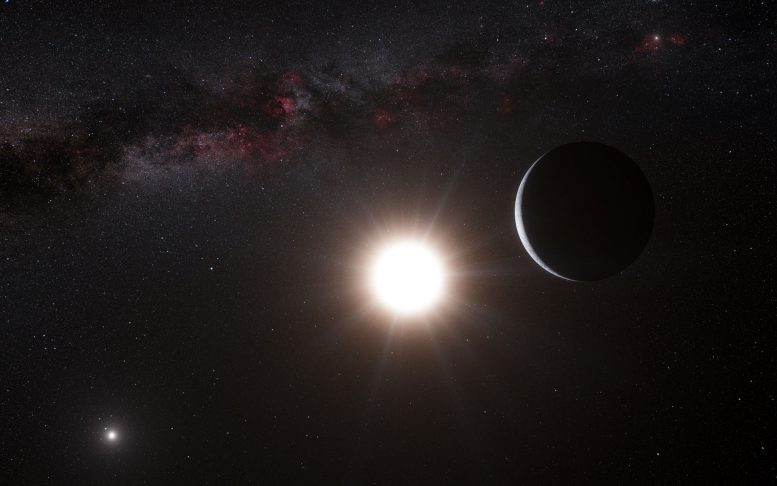
This artist’s impression shows the planet orbiting the star Alpha Centauri B, a member of the triple star system that is the closest to Earth. Alpha Centauri B is the most brilliant object in the sky and the other dazzling object is Alpha Centauri A. Our own Sun is visible to the upper right. The tiny signal of the planet was found with the HARPS spectrograph on the 3.6-meter telescope at ESO’s La Silla Observatory in Chile. Credit: ESO/L. Calçada/N. Risinger (skysurvey.org)
Astronomers have uncovered a low-mass planet orbiting α Centauri B, a member of the stellar system neighboring our Solar System. Although the exoplanet is nearly identical to Earth in mass, it’s much closer to its star than Mercury to the Sun, so it’s expected to be scorched and barren. As astronomers search α Centauri for more hospitable worlds, its astronomical proximity will probably spur dreams of interstellar exploration projects.
Scientists reported their findings in the journal Nature. The exoplanet was found using a technique that monitors a star for subtle back-and-forth motion as seen from Earth, which is caused by the gravitational tug of an orbiting body. This allowed researchers at Geneva to discover the first exoplanet orbiting a Sun-like star in 1995.
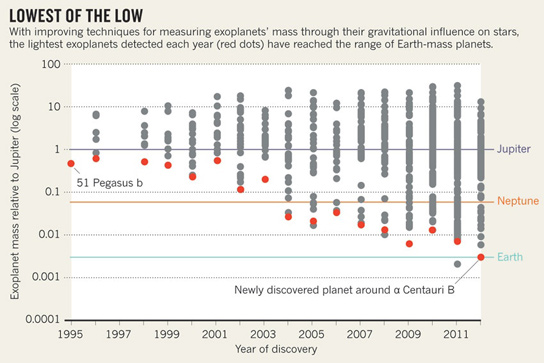
The exoplanet was discovered as part of a campaign to monitor ten of the brightest and nearest stars visible from the Southern Hemisphere using the High Accuracy Radial Velocity Planet Searcher (HARPS) spectrograph on the European Southern Observatory’s 3.6-meter telescope located in La Silla, Chille. Three of those stars have already yielded exoplanets, and the Alpha Centauri system is the fourth. It took nearly three years, measuring the star’s velocity late at night, in order to tease out the subtle motion measured right above the threshold for the detection limit of the spectrograph.
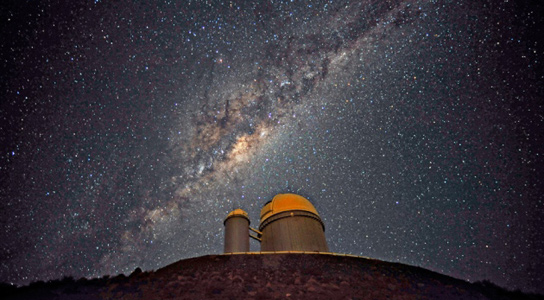
The 3.6-meter telescope at La Silla in Chile is home to the HARPS spectrograph, which has spotted the nearest Earth-sized exoplanet to our Solar System so far. Credit: Photo by S. Brunier/ESO
For now, astronomers haven’t found any Earth-sized exoplanets in the habitable zones of their stars, states William Borucki, principal investigator. This might be because Earth-sized planets are less common and harder to form.
The Alpha Centauri system is composed of a trio of stars 1.34 parsecs away (4.4 light-years), two of which are very near from each other, as close as 1.4 billion kilometers. This could disrupt the orbits of planets farther out than the one discovered.
This video shows an imaginary journey from Earth to the Alpha Centauri system. As we leave the Solar System we see the familiar constellation figures including the Southern Cross (Crux) and the bright stars Alpha and Beta Centauri. As we approach Alpha Centauri we pass a faint red star, this is Proxima Centauri, the closest star to Earth and the faintest component of a triple star system. The final part shows the bright double star Alpha Centauri A and B with the Sun visible in the background. Alpha Centauri B is known to be orbited by an Earth-mass planet, the closest exoplanet to the Solar System. Credit: ESO./L. Calçada/Nick Risinger (skysurvey.org)
This video shows a fly-through of the bright double star Alpha Centauri A and B. In the final sequence we close in on Alpha Centauri B and a newly discovered planet swims into view. This Earth-mass planet is the closest exoplanet known and the lightest ever found around a star like the Sun. Credit: ESO./L. Calçada/Nick Risinger (skysurvey.org)
Reference: “An Earth-mass planet orbiting α Centauri B” by Xavier Dumusque, Francesco Pepe, Christophe Lovis, Damien Ségransan, Johannes Sahlmann, Willy Benz, François Bouchy, Michel Mayor, Didier Queloz, Nuno Santos and Stéphane Udry, 17 October 2012, Nature.
DOI: 10.1038/nature11572


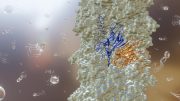
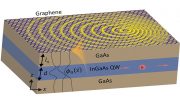

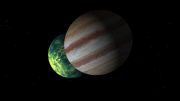

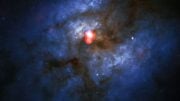

Be the first to comment on "Earth-Sized Exoplanet Discovered in Alpha Centauri System"